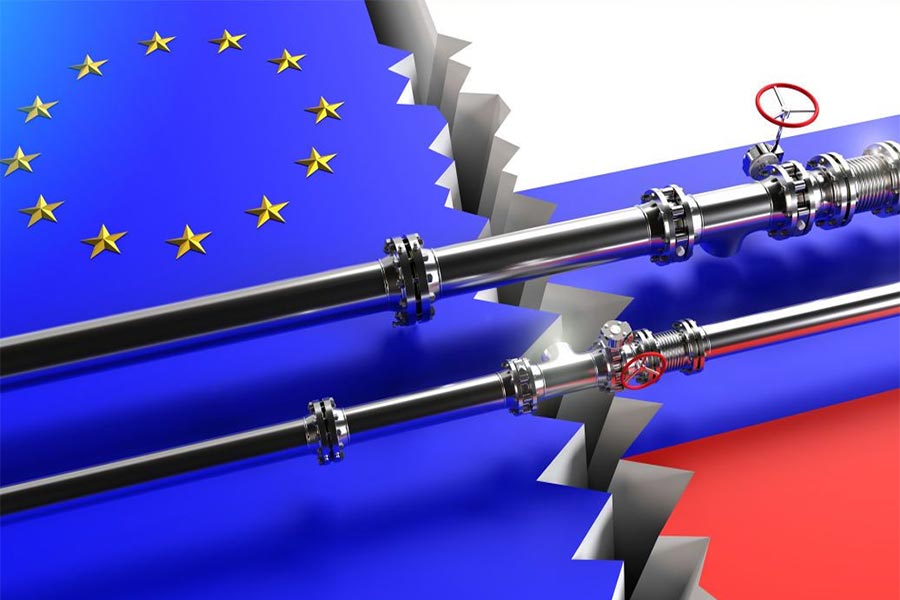The European Union and G7 must tighten their grip on Russia’s key revenue streams from exports of fossil fuels, say more than 280 European, international and Ukrainian NGOs in a joint public appeal to leaders of the EU and G7. As the tragic anniversary of two years of full-scale war hits Ukraine, there is a clear need to ban Russian LNG gas imports and close all loopholes in existing sanctions to prevent further escalation of Russia’s aggression in Europe beyond Ukraine. The EU’s and G7’s financial support for Ukraine dwindles compared to the inflow to Russia’s war chest from ongoing exports of fossil fuels. It is paramount to now fully end the financing of the Russian war machine through fossil fuel imports, which is still a sad reality.
In solidarity with the Ukrainian people, civil society groups demand the G7 and EU to:
- Fully enforce and lower price caps on Russian crude oil and oil products.
- Prevent Russia from further expanding the shadow fleet of dangerous, practically uninsured and unaccountable old tankers, operating through illegal and dubious management arrangements and lacking transparency in ownership.
- Close the “refining loophole”, which allows EU and G7 countries to import oil products — mainly diesel, jet fuel and gasoline — produced from Russian oil at refineries in third countries like India, Turkey or UAE.
- Fully ban liquefied natural gas (LNG) imports from Russia and its transshipment in European ports for exports to other countries.
- Take decisive actions to reduce oil and gas consumption and end import dependency to deflate the Russian war economy.
Russia’s 2024 federal budget demonstrates a staggering allocation of resources to the military-industrial complex, unprecedented since Soviet times. A startling shift in budgetary focus, with a third dedicated to military spending, underscores the alarming escalation of aggression. In 2024, Russia’s “national defence” budget will expand to 10.775 trillion rubles ($110 billion), marking a 70% increase from 2023, more than doubling from 2022, and three times higher than the pre-war 2021 allocation.
Since the start of the full-scale invasion in Ukraine on February 24, 2022, Russia has amassed more than $600 billion in profits from fossil fuel exports. It is rushing to develop new Siberian and Arctic LNG gas fields. Russia’s ongoing fossil fuels expansion in the Arctic can set a fuse to numerous carbon bombs and pose a dire threat to international efforts on climate change mitigation. Oil and gas exports pay for Russia’s further militarization, signifying a perilous path towards conflict intensification, escalation outside Ukraine and threatening the future of democracy and the rule of law.
“Today, Ukraine is in peril because of the Russian invasion, and the world is on fire because of the climate emergency. Both are fueled by Russian oil and gas proliferation. Europe and G7 must collectively ban imports of Russian fossil fuels, close all loopholes in sanctions and accelerate the energy transition at a war-time pace with proper allocation of investments into renewable energy and energy efficiency. We need more insulated homes, more solar panels and heat pumps to defeat Putin, rebuild Ukraine green and create a better world, free from the tyranny of fossil fuels.”
– Kostiantyn Krynytskyi, Head of the Energy Department at Centre for Environmental Initiatives Ecoaction.
Yet, if international sanctions on Russia’s fossil fuel industry are maintained and rigorously enforced, the International Energy Agency projects that the Kremlin’s expansion plans would collapse and profits from oil and gas could plummet by 40 to 50% by 2030. With the two-year anniversary of Russia’s war on Ukraine this week, this is the time for more sanctions and action from the EU and G7 nations. Ending Russia’s war of aggression is necessary for stability and safety across the entire world, and political leaders need to act now to make this happen.

